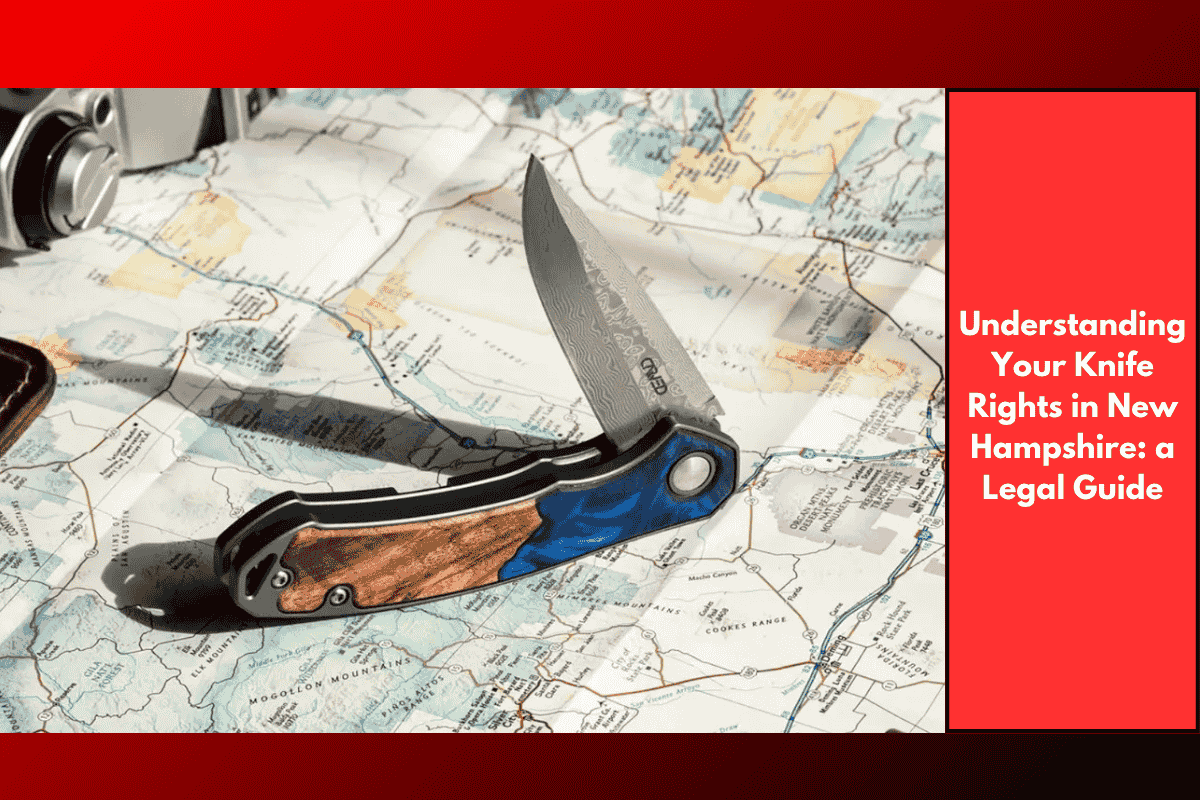New Hampshire is known for its progressive approach to many laws, particularly when it comes to personal freedoms. For those interested in knives, whether for self-defense, work, or recreation, understanding the state’s laws surrounding the ownership, carrying, and use of knives is crucial. In this guide, we’ll break down New Hampshire’s knife laws, providing clarity on what you can and cannot do when it comes to knives in the Granite State.
Are Knives Legal to Own in New Hampshire?
Yes, in New Hampshire, knives are legal to own. There are no statewide restrictions on the ownership of knives. Whether it’s a pocket knife, folding knife, or fixed-blade knife, as long as you’re of legal age, you are free to possess these tools. However, while owning knives is generally permissible, how and where you carry them is subject to some regulations.
Types of Knives and Legal Considerations
In New Hampshire, the legality of a knife can depend on the type of knife you own and how you intend to carry or use it. Here’s an overview of the different types of knives and the legal guidelines:
Folding Knives and Pocket Knives:
These knives are typically legal to carry in public spaces. Pocket knives are considered tools, and there are no specific restrictions on carrying them, whether concealed or openly, in most situations. These knives are legal as long as they are not used for illegal purposes or carried with intent to harm others.
Automatic Knives (Switchblades):
New Hampshire legalized the possession and carrying of automatic knives (often referred to as switchblades) in 2016, which means that owning a switchblade is legal in the state. These knives have blades that open automatically with the push of a button or lever.
However, you should be aware of restrictions on the use and carrying of these knives in certain places, such as schools, government buildings, or private property where carrying might be prohibited.
Bowie Knives and Fixed-Blade Knives:
There are no state laws specifically restricting Bowie knives or large fixed-blade knives in New Hampshire. These knives are legal to own and carry, provided they are used for lawful purposes, such as hunting or outdoor activities.
Throwing Knives and Daggers:
Throwing knives and daggers are legal to possess in New Hampshire, but if they are carried in public with intent to use them as weapons, they may be subject to legal scrutiny. As with any weapon, intent plays a crucial role in determining whether an action is legal or illegal.
Carrying Knives: What the Law Says
While owning a knife is legal in New Hampshire, the manner of carrying and intent to use the knife are crucial aspects of the law. Here’s what you need to know:
Open Carry:
Open carry of knives, including pocket knives and fixed-blade knives, is generally legal in New Hampshire. There are no specific restrictions on carrying a knife in public as long as it’s not used in an aggressive or threatening manner.
Concealed Carry:
Concealed carry of a knife is also legal in New Hampshire, provided the knife is not carried with criminal intent. Unlike some other states, New Hampshire does not have specific laws that restrict the concealed carry of knives. However, if a knife is concealed in a way that could be seen as threatening or dangerous, it may be scrutinized by law enforcement.
Carrying Knives in Restricted Areas:
Schools: It’s illegal to carry knives, including pocket knives and switchblades, onto school property in New Hampshire. Laws are strict about the possession of weapons, including knives, on school grounds, and violators can face serious penalties.
Government Buildings: Carrying knives into government buildings or courthouses is prohibited. If you enter these places and are found carrying a knife, you could be asked to leave or face legal consequences.
Intent to Use:
While it’s legal to carry a knife in New Hampshire, carrying a knife with the intent to use it as a weapon (for example, during a confrontation) can result in criminal charges. Assault or threatening with a knife is illegal, and you could face serious charges, including aggravated assault, if you use the knife to harm someone.
Are There Any Knife Carrying Restrictions in New Hampshire?
While New Hampshire has relatively liberal knife laws, some restrictions still apply in specific scenarios:
School Zones: As mentioned, knives are not allowed in schools, including public, private, or charter schools. If you are found with a knife on school property, even if it’s a pocket knife, you could face criminal charges.
Private Property: Private property owners can set their own rules about carrying knives. If a store, business, or individual asks you to leave because of a knife, you must comply with their requests to avoid trespassing charges.
Penalties for Violating Knife Laws
Violating New Hampshire’s knife laws can result in criminal charges, fines, or other penalties. Here’s what could happen if you break the law:
Possessing a Weapon with Criminal Intent: Carrying a knife with the intent to harm or threaten someone is considered a serious criminal offense in New Hampshire. Depending on the situation, this could lead to assault charges, which may carry severe penalties, including jail time.
Penalties for Carrying a Knife in Restricted Areas: If you’re caught carrying a knife on school grounds or in government buildings, you could face criminal charges, fines, or possibly even imprisonment, depending on the severity of the violation.
Fines and Jail Time: Violating any knife laws in New Hampshire, such as carrying a prohibited knife or using a knife in a threatening manner, can lead to fines or jail time, especially if it involves a public safety concern or criminal behavior.
What Should You Do to Stay Within the Law?
To ensure you’re following the law when it comes to knives in New Hampshire:
Know the Types of Knives You Own: Understand the legality of the specific type of knife you own. For example, while pocket knives and switchblades are legal to possess, be aware of where and how they can be carried.
Carry Knives Responsibly: If you carry a knife, do so responsibly. Avoid carrying it in an aggressive manner or in places where it might be illegal. Be mindful of schools, government buildings, and private property that may prohibit knives.
Avoid Criminal Intent: Carry a knife only for lawful purposes, such as for work, recreation, or self-defense. Carrying a knife with the intent to use it as a weapon can lead to criminal charges, so always keep your actions within the bounds of the law.
In New Hampshire, knives are generally legal to own and carry, but it’s important to understand the regulations surrounding their possession, especially when it comes to carrying them in public or restricted areas. The state offers a fair amount of freedom in terms of carrying pocket knives and even switchblades, but all knife owners must exercise caution to ensure that their actions do not violate laws against assault, harassment, or disorderly conduct.
By staying informed about New Hampshire’s knife laws, respecting restricted areas, and being aware of your intent when carrying a knife, you can enjoy the use of your knives without running into legal trouble.
SOURCES
[1] https://nobliecustomknives.com/us-knife-laws/new-hampshire-knife-laws/
[2] https://www.akti.org/state-knife-laws/new-hampshire/
[3] https://www.shokuninusa.com/it-eu/blogs/news/pocket-knife-laws-knife-length-laws-usa
[4] https://worldpopulationreview.com/state-rankings/knife-laws-by-state
[5] https://mywaynecountynow.com/understanding-your-knife-rights-in-new-hampshire-a-legal-guide/














